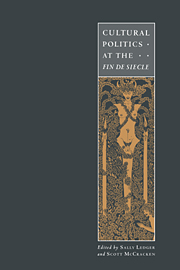Book contents
- Frontmatter
- Contents
- List of illustrations
- Notes on contributors
- Acknowledgements
- Introduction
- 1 The flight to the real
- 2 The New Woman and the crisis of Victorianism
- 3 Empire, ‘race’ and feminism at the fin de siècle: the work of George Egerton and Olive Schreiner
- 4 W. B. Yeats and Irish cultural politics in the 1890s
- 5 The double lives of man: narration and identification in late nineteenth-century representations of ec-centric masculinities
- 6 Henry James and the spectacle of loss: psychoanalytic metaphysics
- 7 ‘A very curious construction’: masculinity and the poetry of A. E. Housman and Oscar Wilde
- 8 The Pilgrims of Hope: William Morris and the dialectic of romanticism
- 9 Urban utopias: socialism, religion and the city, 1880 to 1900
- 10 Vampires and the empire: fears and fictions of the 1890s
- 11 Utopia, Limited: nationalism, empire and parody in the comic operas of Gilbert and Sullivan
- 12 Technologies of monstrosity: Bram Stoker's Dracula
- 13 Postmodernism, a Chance to reread?
- 14 Is market society the fin of history?
- Select bibliography
- Index
3 - Empire, ‘race’ and feminism at the fin de siècle: the work of George Egerton and Olive Schreiner
Published online by Cambridge University Press: 29 September 2009
- Frontmatter
- Contents
- List of illustrations
- Notes on contributors
- Acknowledgements
- Introduction
- 1 The flight to the real
- 2 The New Woman and the crisis of Victorianism
- 3 Empire, ‘race’ and feminism at the fin de siècle: the work of George Egerton and Olive Schreiner
- 4 W. B. Yeats and Irish cultural politics in the 1890s
- 5 The double lives of man: narration and identification in late nineteenth-century representations of ec-centric masculinities
- 6 Henry James and the spectacle of loss: psychoanalytic metaphysics
- 7 ‘A very curious construction’: masculinity and the poetry of A. E. Housman and Oscar Wilde
- 8 The Pilgrims of Hope: William Morris and the dialectic of romanticism
- 9 Urban utopias: socialism, religion and the city, 1880 to 1900
- 10 Vampires and the empire: fears and fictions of the 1890s
- 11 Utopia, Limited: nationalism, empire and parody in the comic operas of Gilbert and Sullivan
- 12 Technologies of monstrosity: Bram Stoker's Dracula
- 13 Postmodernism, a Chance to reread?
- 14 Is market society the fin of history?
- Select bibliography
- Index
Summary
That nineteenth-century British feminist literary identity was inextricable from contemporary ideologies of ‘race’, empire and colonialism, was pointed out as long ago as 1985 by Gayatri Spivak, in her essay ‘Three Women's Texts and a Critique of Imperialism.?’ Nonetheless, recent critics of New Woman fiction have persisted in ignoring the connections, as does Gerd Bjorhovde, or alternatively have acknowledged them only to claim, as does Ann Ardis, that the writers constantly challenge ‘the pattern of thinking in hierarchically organized binary opposites that pits men against women, “good” women against “fallen” ones, the middle class against the working class, and European against non-European cultures’ (emphasis added). Against this I want to argue that for many nineteenth-century white English women writers, it was precisely through collusion with, and not in opposition to, hierarchical notions of ethnic and cultural difference, that feminist identity was articulated. Following Spivak, I will argue that this writing articulated female individuation in relation to ‘two registers: childbearing and soul making. The first is domestic-society-through-sexual reproduction cathected as “companionate love”; the second is the imperialist project cathected as civil-society-through-social-mission’. The first register translates into a highly maternalized imperial feminism, definable as the making of racial bodies (a eugenically inspired concept), while the second translates into an equally, though metaphorically, maternal and missionary notion of feminism as the making and saving of souls. The two writers I will examine – George Egerton and Olive Schreiner – utilize these notions, among others, to rather different ends.
- Type
- Chapter
- Information
- Cultural Politics at the Fin de Siècle , pp. 45 - 65Publisher: Cambridge University PressPrint publication year: 1995
- 11
- Cited by



